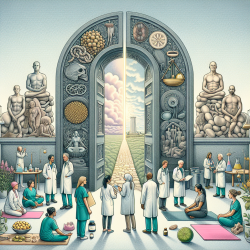Introduction
In the realm of oncology, the integration of complementary therapies alongside traditional treatments has sparked significant interest. The study titled "Evaluation of How Integrative Oncology Services Are Valued between Hematology/Oncology Patients and Hematologists/Oncologists at a Tertiary Care Center" sheds light on the differing perspectives between patients and physicians regarding integrative modalities. This blog explores the key findings of the study and offers insights on how practitioners can enhance their approach to integrative oncology.
Understanding the Discrepancy
The research surveyed 1008 patients and 55 physicians, revealing that patients generally value integrative modalities more than physicians do. Services such as nutrition, exercise therapy, spiritual counseling, and music therapy were highly regarded by patients, while physicians showed less enthusiasm, with the exception of support groups.
This discrepancy may stem from a knowledge gap among physicians regarding the efficacy and safety of these modalities. The study suggests that increased education and awareness could bridge this gap, aligning physician perspectives with patient expectations.
Implementing Integrative Modalities
For practitioners, embracing integrative oncology requires a commitment to education and openness to complementary therapies. Here are some actionable steps:
- Expand Knowledge: Attend workshops and seminars on integrative oncology to stay informed about the latest research and practices.
- Collaborate with Specialists: Work with integrative medicine specialists to develop comprehensive care plans that incorporate complementary therapies.
- Educate Patients: Provide patients with evidence-based information about the benefits and risks of integrative modalities, empowering them to make informed decisions.
- Monitor Outcomes: Track patient outcomes to assess the effectiveness of integrative therapies and adjust treatment plans accordingly.
Encouraging Further Research
While this study provides valuable insights, further research is needed to deepen our understanding of integrative oncology. Practitioners are encouraged to contribute to this growing field by conducting studies that explore the long-term effects of integrative therapies on patient outcomes.
Conclusion
Integrative oncology holds the potential to enhance patient satisfaction and improve clinical outcomes. By aligning physician perspectives with patient expectations and embracing a holistic approach to cancer care, practitioners can unlock the full potential of integrative modalities. To read the original research paper, please follow this link: Evaluation of How Integrative Oncology Services Are Valued between Hematology/Oncology Patients and Hematologists/Oncologists at a Tertiary Care Center.










